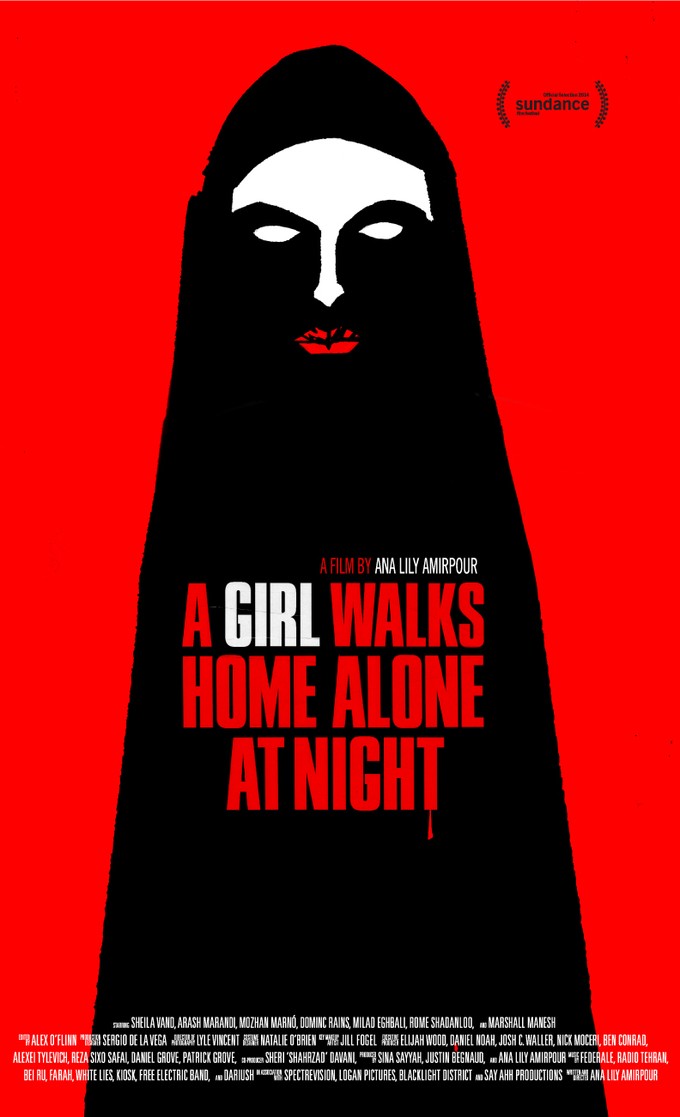
You don't see a lot of Iranian vampire movies. You don't see a lot of Iranian westerns. You don't see a lot of strong female protagonists in Iranian films. And you certainly don't see a lot of Iranian films that were actually made in
You could make the case that Ana Lily Amirpour's A GIRL WALKS HOME ALONE AT NIGHT isn't an Iranian movie, given that Amirpour grew up in California and shot her film in Bakersfield and the surrounding areas. But the cast is Iranian, the dialogue is in Farsi, and the Iranian-American perspective, along with Amirpour's clear sense of style, is able to make these well-worn pop culture elements like vampires, pimps, and hookers seem fresh and original.
I met Ms. Amirpour, and was charmed by her level of openness, honesty, and confidence in the quality of her film. I got the feeling that no matter how it was received, she was proud of A GIRL WALKS HOME ALONE AT NIGHT because it was uncompromisingly, unabashedly her film, a rarity for first time American filmmakers. Read on to learn about her influences, her aspirations, and why she was so inclined to make a black & white, largely dialogue-free, music-heavy vampire-western in Farsi:
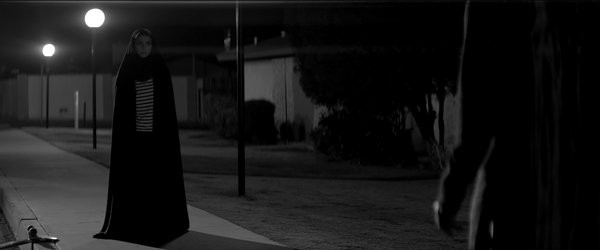
VINYARD: One of the thing I didn't realize when I was watching the movie was that you shot it here, you shot it in Bakersfield and some other locations in southern California. I guess Bad City, the city (the movie) is supposed to take in, is supposed to be in Iran. Is that correct?
ANA: Well, did you think it was supposed to be Iran?
VINYARD: Yes. I assumed it was Iran just because of the oil fields, the fact that all the characters are dressed in Iranian clothing, speaking in Farsi.
ANA: But like…where is Gotham?
VINYARD: I'd say Gotham is in America, in the U.S.
ANA: SIN CITY's in America?
VINYARD: Yeah.
ANA: But they're not really real.
VINYARD: No.
ANA: So…that's the way I think of Bad City. It's an Iranian Gotham-ish kind of archetypal lawless ghost town. Not as big as…SIN CITY and Gotham are kind of like metropolises, they're like big cities. I think Gotham is like a mock New York, SIN CITY is a mix of L.A. and Chicago maybe. Mine was more of a fairy tale, Sergio Leone kind of dark fairy tale.
VINYARD: Like a western sort of ghost town. Because I've heard the film described as a western, but when i was watching it, the themes aren't necessarily the themes of a western, and the archetypes aren't necessarily western archetypes, but the setting is very evocative of a western. So that was something you were definitely going for, that Leone-esque vibe?
ANA: Leone-esque type of town, this lawless, transient feeling. Also the music for sure, that Ennio Morricone-ish spaghetti western music throughout the film. There's a certain pacing and tension and stuff in a western that I refer to a lot.
VINYARD: Back to the music, there's a whole mix of stuff. Like you said, there's the Ennio Morricone-type score, then there are pop songs in there of different styles, and then some Iranian folk music here and there. It's very crucial to the vibe of the film; there are long stretches where the music is emotionally dictating the action. What do you think of music in terms of its relationship to…
ANA: Me?
VINYARD: Yes, because I went to film school, and they shove down your throat that image comes first. You lock the image, and then you come up with the music, but I have the feeling it didn't quite play out like that for you.
ANA: The thing about film school is that to me- I went to film school for my grad school- to me, filmmaking is like fucking, it's like sex. You can't teach it, you ahve to do it, it's the only way to learn it. It's gonna be awkward at first. It's really about getting to where you're enjoying it, honestly and in truth, it only happens when you really start to get honest about what you don't like, not so much what you do like. 'Cause you never know what you're gonna like or be into, it could be very surprising. But you have to be honest about what you don't like, you can't fake it. There's no rules to fucking, and there's no rules to filmmaking. Yeah, you can draw a diagram and certain parts go here and here, but that doesn't really mean anything. At the end of the day, you're just pointing a camera at people and saying shit and doing shit, and that's what it is. I just have to be having a good time and really not lying about it. The things that I love are what lead me, and I just invite people in.
Music…I grew up playing music. I was in a band at one point, I DJ now. I love music more than anything, and I feel like in art, music is unmatched, because music that you love, when you love music…it's pure emotion. The moment takes you completely. The only thing I can compare it to is like a great sexual experience, but that's not consistent. With music, you can just live there, you want to crawl inside a song and live in there. It's like endlessly revisitable. Nothing is like that, it's so powerful. Yeah, when I'm writing, sometimes I'm listening to music. Before I have a scene, I'll know the song that feels like what it's going to feel like. Sometimes it's very specific, and I'm like, "This is the song." I build a sequence around it. Anytime a song was played in the film, I played it on set. All the actors, all the crew, my D.P., my editor, every single grip, everybody had the soundtrack. Played it on scouting trips. It brings people together, it's so powerful. I love it.
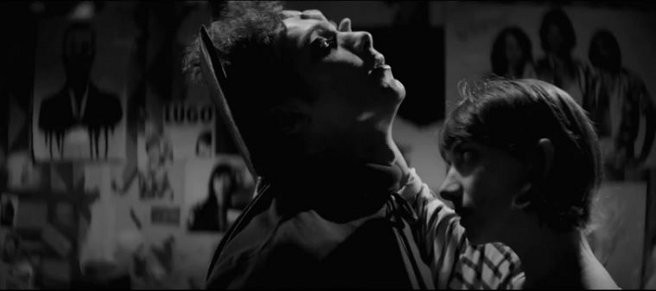
VINYARD: Another filmmaker who your film reminded me of who also uses music really critically is Jim Jarmusch, specifically Jarmusch's DEAD MAN in terms of the black and white photography, very long, quiet stretches, that western sort of vibe.
ANA: It's funny for a few reasons. One is like I'm not a huge Jarmusch fan. He's been brought up more than anybody else over the last nine months, and I get it. I take it as a huge compliment, I have no problem at all with it, But it's funny because even though I have seen almost all his films, my favorite Jarmusch films were GHOST DOG- which is not really a Jarmusch film- and then ONLY LOVERS LEFT ALIVE…which is so similar to my film. i saw ONLY LOVERS LEFT ALIVE with Sheila (Vand) when we were in post, so we would have been making our films at the same time. I did hear that Jarmusch was making a vampire film, but I didn't know anything. We were sitting there, me and Sheila, and there's this Tilda Swinton vampire putting on music and dancing in a room. And I'm just like, "Whoa…me and him are clearly huffing on the same fumes." The music, and the pop, and the culture, and the books, that's what keeps (Tom Hiddleston's character) company over centuries of loneliness…
Anyway, back to DEAD MAN. I hadn't seen DEAD MAN, and the gaffer of my film, during shooting, he was like, "You must love Jarmusch," and I was like, "No…not really." And he's like, "Wow, this is so DEAD MAN," And I'm like, "Ok, I guess I better…" So when we wrapped, I watched it, and I'm just like, "God, I hope I'm not making this movie." I was like so bored. It's so slow. I know my movie's definitely got a deliberate pace, but damn, that movie's so slow. I don't think I sat through it in one sitt.
VINYARD: I'm a fan, but I've tried to show it to scores of my friends, especially in film school, like "You gotta see this movie!" No one could make it 20 minutes in. I find myself waking up and going, "Oh no, everyone's asleep!"
ANA: When you love a filmmaker, it's different than when you love a movie.
VINYARD: Agreed.
ANA: I'm a huge fan of certain filmmakers, and I just want to live in a world where they create. It doesn't matter to me what the goal or the result is, it's just that they get to create in this world we live in. I wanna see whatever Harmony Korine does. I do, I want to. I know that he's going on adventures exploring braincaves. Lynch, I want to live in a world where Lynch makes films. Now he's doing TWIN PEAKS, and it's like…awesome.
VINYARD: Yeah, it's great.
ANA: I wanna see what Lars Von Trier does next. I wanna see Tarantino's movies. I wanna see Robert Zemeckis' next one. There's certain people…I just so badly want to see what they're gonna do.
VINYARD: Making your first feature, was there any sort of tension like, "This is me staking my claim. This is how I'm announcing myself as an artist, so it has to represent what I've been learning and what I've been developing in terms of my vision." Was that very important?
ANA: Very important. I'm very lucky, because I had two other feature projects that I was…the year before I went to Germany- I was in Germany for five months, I gaffed, right before I came and did GIRL. I wrote the script a few months after I got back from Germany. I got very lucky that the two films that I was trying to do didn't go before I left, because…everyone's backwards in this town about how they make films. To me, it's art. It's really searching for my soul. I'm just trying to figure out how to be a human being. I have to make art, I have to see what's in here (gestures to abdomen) and dig it out. That's all I want to do. It's never the same thing, it's constantly changing. I would say that I'm more of an inventor than anything else. Doc Brown in BACK TO THE FUTURE is just a madman who's really excited about his ideas, to make things that don't exist out of the things that are there, that do already exist. But the DeLorean has to work in order for him to not just like get committed, which in BACK TO THE FUTURE II, in the alternate bad future that he has to face, Doc Brown did get committed. You have to just be unapologetically fascinated by what you're fascinated by.
That's why I was so lucky. It was so nice. I went to Germany, and it's different in Europe. In the European system, the director, the auteur is on top. Nobody ever even questions that for a second. The idea that you wouldn't have final cut is like a ridiculous notion. They think it's ridiculous. I think what happened was before, I was caught in that backwards gear-shifting like, "This actor is the actor it's packaged for, and then the financing comes here, and then you fit the story to be this marketable in this way." It's like thinking in reverse. It should be the idea, and then seeing what the idea wants. Let it be made out of those things. It's like building a house with no foundation, it's not gonna last. I left, went to Germany, and in Germany, the Germans are the most like…there's no taboo. You can be as freaky as you want as a filmmaker or as an artist. My sensibility in Germany is extremely commercial. It was quiet, I was in a different time zone, and I was like, "I'm gonna go back, I'm gonna do my first feature. I'm just gonna write something where every second, all the shit that they say and do, every second of it is shit that I love." I came back, I was like, "Sheila, I'm gonna do a vampire movie, an Iranian vampire movie like a comic-book, graphic novel world. I want you to be my vampire. We're gonna cut your hair short." And she went, "Yeah!" I wrote the script really fast and…
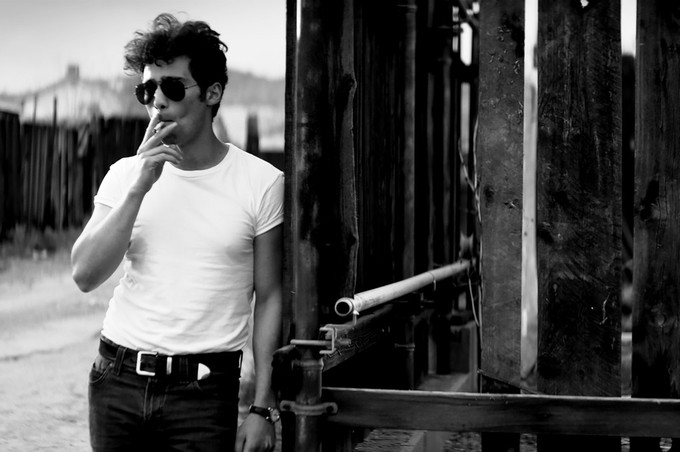
VINYARD: You got the rest of your cast from L.A.?
ANA: I knew them all. I knew Dom (Rains, who plays Saeed "The Pimp"), I wrote that part for him. I knew Arash (Marandi, the lead) from Germany, he was living out there, like, "Oh, Persian James Dean." Had to be him, there's no one else who could play that part.
VINYARD: They announced an ALI BABA movie in the trades, and the three male leads that they're testing are all white. I think one of them's British…
ANA: What's it called?
VINYARD: I think they're just going with ALI BABA AND THE FOURTY THIEVES. It just kills me every time…
ANA: LAWRENCE OF ARABIA…
VINYARD: Even PRINCE OF PERSIA, more recently than that. Your movie proves that you can get talented Iranian actors in southern California who, like you said, look the part and can do what they're asked. That's another aspect of the backwards thinking of Hollywood, getting a big American name to play Ali Baba instead of an Iranian (or Arab) just doesn't make sense to me.
So casting was pretty easy, you knew everyone beforehand. I was thinking that auditioning Farsi-speaking actors in L.A. would be a little bit…
ANA: I think auditions are the most…horrible…awful, useless things. I hate them. I never do them, I never will do them. I'm doing my next movie in the spring, and…I'm not doing them. I don't do it that way.
VINYARD: Same way, you'll just use people you know?
ANA: I know more people now because of that film, and that's really the whole point. The big picture is that you do something from who you really are, related to what you know. This is what I know. I stand behind the experience of that film. It's 100% my groove, you know? Then people like it, and when that happens, they want to work with people who are doing something fresh and different and exciting. I've met more people in the last year, and I'm doing a movie with them. And they're known actors and stuff, but it's not like Brad Pitt or something.
VINYARD: Right, someone who, like you said, you'd have to tailor the project to.
ANA: Right, and I would never do that. I believe in a capitalist world, I don't believe in socialism or whatever, but in a film, I believe that no part of the film should be greater than the film. I feel that the film is the biggest star, and everybody's just a part of it. You start putting these movie stars, and it's like…you think it's the end of you. A film is like this place, and you're in it for a while, and…this sickness takes over, this celebrity. There's no exciting actresses anywhere, it's all these Instagram kids and…I don't know. Who's the exciting young female actress, other than Jennifer Lawrence, who is special, and wonderful, and the most powerful actress right now? Is there any? I think 10 years ago, you had Cameron Diaz, Juliette Lewis, Uma Thurman...
VINYARD: Cate Blanchett…
ANA: Cate Blanchett, Winslet, you had Marisa Tomei, what a woman, you know? Julia Roberts, even Reese Witherspoon, they're all different. Now, it's like they're all the same. Anne Hathaway, Kristen Stewart, there's a sameness washing over them all.
VINYARD: It's a safeness more than a sameness. It's a lack of bravery posing as bravery I think. There's a textbook way of seeming "indie" or "fresh," and everybody's kind of playing by the same playbook, and it's hard to get noticed as an actress when you're not taking those roles, the showy Oscar roles. Can you talk at all about the movie you're working on right now?
ANA: I can tell you very little, but it's called THE BATCH. It's in color, and in English. It's a desert-set film, a post-apocalyptic cannibal love story. Kind of like a psychedelic ROAD WARRIOR. Very, very violent and romantic, with a really, really dope soundtrack.
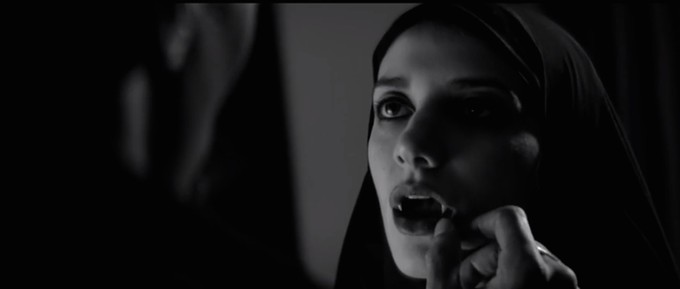
VINYARD: So you're really into genre stuff, 'cause this is a horror/western, and now you're going post-apocalyptic, ROAD WARRIOR kind of sci-fi.
ANA: I definitely grew up loving fairy tales, fantasy. My favorite movies are all over the place in some ways, but in a way they're all fairy tales: BACK TO THE FUTURE, THE NEVERENDING STORY, BLADE RUNNER. Even Lynch, WILD AT HEART, LOST HIGHWAY, it's all like a dark fairy tale. I definitely am into creating a world. Tarantino makes his own world…it's fun to make your own world.
VINYARD: And now you're exploring Bad City in comic book form?
ANA: Yeah, it's a comic book, I got to make a comic book simultaneously at the end. I got lucky, because no one makes comic books anymore. I had all this vampire backstory which I made for the actress, Sheila, who she was, her whole 187-year story. She got made a vampire when she was 19. She had this fever for three nights, thought she was gonna die. They had her on the balcony to try and cool her down, and then one night, this giant bird came and picked her off the balcony. She woke up in Romania. It wasn't a bird, it was this vampire, Gabriel, very, very old who wanted someone to hang out with so he turned her into a vampire. Anyway, it's long. It's a really cool, long story.
VINYARD: But you explore it in the comic?
ANA: Yeah, because Ben Conrad, one of our executive producers, when i was in post, he was like, "So I'm starting a comic book branch for Logan," the brand that he owns, "you have all those vampire stories…" And he knows I love comics, and that I love Charles Burns, and Frank Miller, and Mark FARM??, kinda like weird, cerebral comics. He's like, "Do you want to make it a comic?" And I was like, "Fuck yeah!" Hooked up with Michael AHAFOEH???, this super-awesome illustrator from New York, so it sort of has that look. I'm so proud of it. And no one gets to do comics, it's a dying art form. It's just like one guy, and it's extremely labor intensive and time consuming. Got six coming out up until Comic-Con in July. Number two just got released two days ago.
VINYARD: Six issues total?
ANA: For Book One, yeah.
VINYARD: Oh, so does Book One end where the movie ends?
ANA: It's kind of like a TV show, 'cause it's all prequel stuff. Nothing that's past the movie's time. But there's A MAN WHO WALKS ALONE AT NIGHT, which would be our Book Two, which would be our maker's story. Really, the comic kinda weaves back and forth in time, so it's interesting. Bad City is kind of like our home camp in a way, and we get back and see flashbacks of things that happened in different times.
VINYARD: Was it weird writing a script for a comic?
ANA: Oh, it's awesome, because if you write, "I want to have her on top a streetlight…"
VINYARD: Done.
ANA: The guy draws it, yeah. Like two thousand bodies in a pile, you know, it's gloriously limitless.
VINYARD: And you'd worked in animation before, right?
ANA: I have, yeah.
VINYARD: I'd imagine it's kind of like "sky's the limit" sort of creativity.
ANA: It's like the purest form of directing. Michael's drawing, but when you get into the rhythm where he gets into the character and the world, it becomes faster. The first issue, you're really getting the look and figuring it out, but the second one, you could feel it building, and now it's like beautiful. You understand what the landscapes look like, and what she looks like.
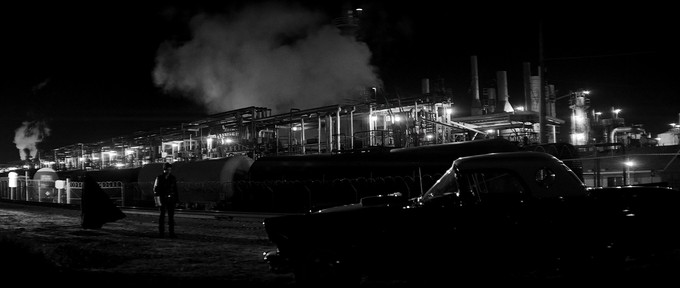
VINYARD: That city's supposed to be Iran, but it's not Iran. It's supposed to evoke Iran.
ANA: It's an Iran of the mind, of (gestures to herself) this mind.
VINYARD: So it's a reflection of Iran. How much time have you spent in Iran?
ANA: I've been to Iran.
VINYARD: What specific aspects of Iranian life were you trying to evoke?
ANA: I'm not trying to evoke any aspects of Iran, so this…I'm trying to evoke aspects of myself. I don't know. I live in L.A., I've been to Iran, I'm Iranian. You're Iranian, you have a very strong sense of being Iranian even though you're not in Iran. I'm certain of this because that's how Iranian families are, particularly our parents' generation. It's an irrelevant thing for me to say what I'm trying to represent. Film, for me, is only an observation of myself. Actually, however Iranian that film is, is how Iranian I am. And it was a mash-up of things western and things from Iran, and other things in pop culture. Music, and different versions of loneliness. That's what it is, it's me. The film is a mirror for you to look at things about yourself and see if there's something there.
VINYARD: That's the thing. Like you said, I'm gonna come at it very differently as an Iranian-American than someone who has very little context for Iranian life. Things like the scene when (a boy and a girl) are in the room together, he's very agitated, like "We can't be here. We can't be in a room alone together." Cultural nuances like that that, and the predominance of the oil fields kind of hanging over everything, huge machines dictating how this town operates. I'm very curious to see what connections someone who was less familiar with Iranian culture would make thinking allegorically about Bad City.
ANA: The thing about human history is that at the same time the story becomes specific to a land and a world…our industry, how that's kind of continuously going on whether or not we're doing our petty little melodramas underneath it. These things are still churning, the industry is still happening. That's not specific. You can be literal, and be like, "Oh, oil, Middle East," but it's a larger dynamic of human history and power in general. There's a place, and an order, and a structure. With sex as well, it's universal. We have hookers, we have drugs, we have desire for love, we have social propriety everywhere, in every country. I think it's interesting for people 'cause they maybe don't get to look at Iran…like look directly at it. I think Iranian cinema is so compartmentalized. It has to be this one thing, like for fuckin' 30 years. It's like, I get it. Life is hard. Children are barefoot. You know what I mean? I get it, I get that, but there's no reason why…movies can be any fucking thing dude! If Marty can go back to 1955 and try and fuck his mother…
VINYARD: In a PG movie!
ANA: Yeah…I can have a fuckin' Iranian vampire in a ghost town who's just trying to see if she can have a good time with all these shitty people, you know what I mean?
VINYARD: But everyone in her world is sort of like her, in that everyone is an outsider. In the credits, it even says "The Junkie," "The Pimp," "The Hooker." They're labeled as outsiders. They're function is to be an outsider.
ANA: Yeah, I love the outsiders.
VINYARD: That's another thing that gives the film its Leone- Leone was obsessed with people like that. Like the guy with no legs in THE GOOD, THE BAD, AND THE UGLY-
ANA: Jodorowsky too.
VINYARD: Oh, forget it.
ANA: Have you seen EL TOPO?
VINYARD: EL TOPO and the most recent one too. There's a ton of-
ANA: I haven't seen it, DANCE OF REALITY?
VINYARD: DANCE OF REALITY, yeah, there's a ton of people like amputees, circus freaks and things like that he likes to pepper his films with, and it does help to create that sort of ghost town, western vibe.
ANA: GUMMO too is such a good film for that.
VINYARD: I have to admit, I've never seen GUMMO.
ANA: You've never seen GUMMO? It's like one of the most important films in my life.
VINYARD: I do like Korine, so I have to get on that. Going into your sophomore movie, you're not worried about following up THE GIRL WHO WALKS HOME ALONE AT NIGHT. You're just thinking, like you said, what's in here-
ANA: What's in here, and the people that I'm working with are…it's like sexual, like I said.
VINYARD: The day-to-day energy.
ANA: I want to connect, I want to feel something. It takes three, sometimes five years of your life to make a movie. How many films is that? I want this time to mean something. I want to care about what I'm doing. No one could make the film that I did first because your first film is like a freebie in a way. You don't exist. You don't have this outward identify yet. People aren't expecting something from you. I'm in a pretty good position, because it's too weird for them to expect. I don't know what people will think. I'd like to do whatever I want. I just wanna have a good time, and enjoy the fact that I'm doing what I'm doing, and not worry about what it's gonna be.
A GIRL WALKS HOME ALONE AT NIGHT is currently playing at the Nuart in L.A. and the IFC Center in NYC, and will be playing in various theaters nationwide through the end of February. For a full list of theaters, visit the official site.
